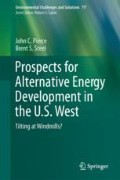Abstract
This chapter focuses on the intersection of AET tradeoff preferences (i.e., local environmental versus global warming considerations), political orientations, climate change beliefs, and political efficacy. The chapter will begin with a discussion of the role of political orientations in shaping views about climate change and climate change science—in particular, the claims of some that opposition to AET as a replacement for reduced carbon-based fuel use is a political position and not one associated with environmental attitudes themselves. This chapter’s findings suggest that indeed political orientations—more specifically liberal/conservative political ideology--are an important predictor of AET tradeoffs, but fail to erase the impact of the New Ecological Paradigm.
Access this chapter
Tax calculation will be finalised at checkout
Purchases are for personal use only
References
Carswell, C. (2012, May 30). The ideological war against renewable energy. High Country News. https://www.hcn.org/blogs/goat/the-ideological-war-against-renewable-energy. Accessed 15 Aug 2016.
Delmas, M. A., & Montes-Sanch, M. J. (2011). U.S. state policies for renewable energy: Context and effectiveness. Energy Policy, 39, 2273–2288.
Devine-Wright, P. (2005). Local aspects of renewable energy development in the UK: Public beliefs and policy implications. Local Environment, 10(1), 57–69.
Devine-Wright, P. (2012). Explaining “NIMBY” objections to a power line: The role of personal, place attachment and project-related factors. Environment and Behavior, 45(6), 761–781.
Dokoupil, T. (2016, January 12). Obama goes big on climate change. MSNBC. http://www.msnbc.com/msnbc/obama-goes-big-climate-change. Accessed 15 Aug 2016.
Elliott, D.E. (2013). Why the United States does not have a renewable energy policy. Washington, DC: Environmental Law Institute. http://www.eli.org. Accessed 15 Aug 2016.
Foran, C. (2015, December 9). Ted Cruz turns up the heat on climate change. The Atlantic. http://www.theatlantic.com/politics/archive/2015/12/ted-cruz -takes-a-stand-against-science/419691/. Accessed 15 Aug 2016.
Gauchat, G. (2012). Politicization of science in the public sphere: A study of public trust in the United States, 1974 to 2010. American Sociological Review, 77(2), 167–187.
Giddens, A. (2011). The politics of climate change (2nd ed.). Cambridge: Polity Press.
Gromet, D. M., Kunreuther, H., & Larrick, R. P. (2013). Political ideology affects energy-efficiency attitudes and choices. Proceedings of the National Academy of Sciences, 110, 9314–9319.
Gross, C. (2007). Community perspectives of wind energy in Australia: The application of a justice and community fairness framework to increase social acceptance. Energy Policy, 35(5), 2727–2736.
Haggett, C. (2010). ‘Planning and persuasion’: Public engagement in renewable energy decision-making. In P. Devine-Wright (Ed.), Renewable energy and the public. Earthscan: London.
Hamilton, L. C. (2008). Who cares about polar regions? Results from a U.S. public opinion. Arctic, Antarctic, and Alpine Research, 40, 671–678.
Hess, D. J., Mai, Q. D., & Brown, K. P. (2016). Red states, green laws: Ideology and renewable energy legislation in the United States. Energy Research and Social Science, 11, 19–28.
Kellstedt, P. M., Zahran, S., & Vedlitz, A. (2008). Personal efficacy, the information environment, and attitudes toward global warming and climate change in the United States. Risk Analysis, 28, 113–126.
Kiley, J. (2015, June 16). Ideological divide over global warming as wide as ever. Pew Research Center. http://www.pewresearch.org/fact-tank/2015/06/16/ideological-divide-over-global-warming-as-wide-as-ever/. Accessed 15 Aug 2016.
Lewandowsky, S., Gignac, G. E., & Oberauer, K. (2013). The role of conspiracist ideation and worldviews in predicting rejection of science. PloS One, 8(10).
Lofstedt, R. E. (1999). Role of trust in the North Blackforest: An evaluation of a citizen panel project. The Risk, 10, 7.
Marquart-Pyatt, S. T., McCright, A. M., Dietz, T., & Dunlap, R. E. (2014). Politics eclipses climate extremes for climate change perceptions. Global Environmental Change, 29, 246–257.
McCright, A. M., & Dunlap, R. E. (2011a). The politicization of climate change and polarization in the American public’s views of global warming. The Sociological Quarterly, 52, 155–194.
McCright, A. M., & Dunlap, R. E. (2011b). Cool dudes: The denial of climate change among conservative white males in the U.S. Global Environmental Change, 21, 1163–1172.
Mooney, C. (2005). The Republican war on science. Cambridge, MA: Basic Books.
Steel, B. S., Lach, D., & Satyal, V. (2006). Ideology and scientific credibility: Environmental policy in the American Pacific Northwest. Public Understanding of Science, 15, 481–495.
Steel, B. S., Pierce, J. C., Warner, R. L., & Lovrich, N. P. (2015). Environmental value considerations in public attitudes about alternative energy development in Oregon and Washington. Environmental Management, 55, 634–645.
U.S. Senate (2012, May 21). Battle over military green energy efforts heads to Senate. http://www.epw.senate.gov/public/index.cfm/in-the-news?ID=6F8C98CA-802A-23 AD-43B0-1470F5B40DE9. Accessed 15 Aug 2016.
Wolsink, M. (2007). Planning of renewables schemes: Deliberative and fair decision-making on landscape issues instead of reproachful accusations of non-cooperation. Energy Policy, 35(5), 2692–2704.
Wood, B. D., & Vedlitz, A. (2007). Issue definition, information processing, and the politics of global warming. American Journal of Political Science, 51, 552–568.
Zia, A., & Todd, A. M. (2010). Evaluating the effects of ideology on public understanding of climate change science: How to improve communication across ideological divides? Public Understanding of Science, 19, 743–761.
Author information
Authors and Affiliations
Rights and permissions
Copyright information
© 2017 Springer International Publishing AG
About this chapter
Cite this chapter
Pierce, J.C., Steel, B.S. (2017). The Devil You Know. In: Prospects for Alternative Energy Development in the U.S. West . Environmental Challenges and Solutions, vol 8. Springer, Cham. https://doi.org/10.1007/978-3-319-53414-5_9
Download citation
DOI: https://doi.org/10.1007/978-3-319-53414-5_9
Published:
Publisher Name: Springer, Cham
Print ISBN: 978-3-319-53413-8
Online ISBN: 978-3-319-53414-5
eBook Packages: Earth and Environmental ScienceEarth and Environmental Science (R0)

